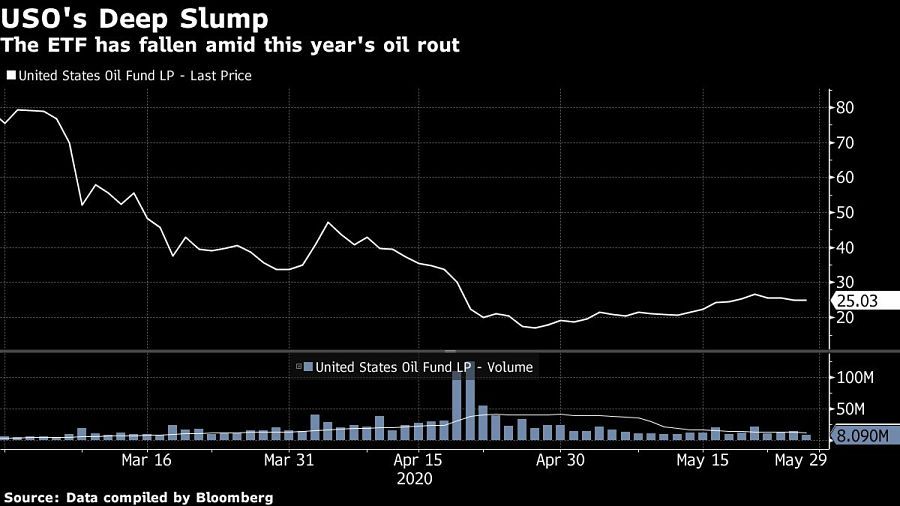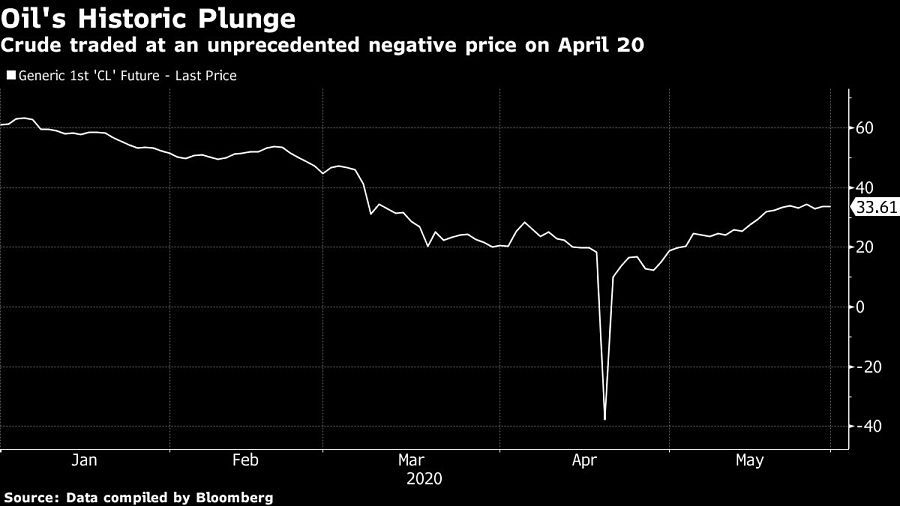Oil ETF faces U.S. probes over disclosures

Both the SEC and the CFTC are looking at whether USO properly disclosed its risks to investors
A popular exchange-traded fund that uses complex derivatives to track oil is being investigated by U.S. regulators over whether its risks were properly disclosed to investors, scrutiny that was triggered by crude’s historic slump during the coronavirus crisis, said three people familiar with the matter.
The Securities and Exchange Commission and the Commodity Futures Trading Commission both have opened probes into the $4.64 billion United States Oil Fund (USO), which lost 75% of its value in the two months ended April 30, said the people, who asked not to be named because the matter is private.
Issues the agencies are examining, the sources said, include whether shareholders were adequately informed that the ETF’s value wouldn’t necessarily move in tandem with the spot price of oil, as well as about the fund’s recent decision to purchase crude contracts that expire further out in the future. The change in contracts USO was buying deviated from its past investment strategy.
The inquiries into the ETF are in their early stages and may not lead to allegations of wrongdoing. United States Commodity Funds, the company that manages USO, hasn’t been accused of any misconduct by the SEC or CFTC.
Senior executives at United States Commodity Funds didn’t respond to multiple requests for comment. Spokesmen for the SEC and CFTC declined to comment.

The investigations are significant because USO has grown to be a dominant player in the market for crude futures. As it got bigger, the ETF attracted legions of mom-and-pop investors who saw it as an easy and simple way to wager on oil. These less sophisticated shareholders are among those who’ve endured heavy losses amid the oil rout, a plunge highlighted by the commodity’s first-ever slide into negative territory on April 20.
USO declined 17 cents to $24.86 as of 9:58 am in New York trading Friday. The shares have fallen 76% this year.
USO has issued six disclosures to shareholders in the last two months noting changes to the fund’s investment strategy, which it has had to quickly rejigger in response to recent events. In the SEC filings, the ETF has said it’s buying longer-dated futures — contracts that are typically less volatile than those that expire in the succeeding month.
The shifts have led to concerns that USO could become increasingly disconnected from the spot oil price that it’s long sought to track. For its part, the fund emphasized in a Tuesday filing that it’s not a proxy for trading directly in oil markets, but carries many of the same risks.
USO has also issued disclosures this month stating that its daily share moves may not correlate with changes in the price of oil and that “recent and unprecedented volatility” in crude markets demonstrates the potential risks of investing in the fund.
USO buys futures, not physical oil. The fund mainly invests in CME Group Inc.’s benchmark West Texas Intermediate contracts. Its WTI holdings became huge in March as oil plunged, a drop triggered by falling demand during the coronavirus pandemic and a price war between Saudi Arabia and Russia.
Extreme concentration
Even before oil fell to minus $37.63 a barrel on April 20, investors who concluded the rout had bottomed out rushed to purchase shares of USO to bet on a rebound. That buying surge contributed to USO amassing a quarter of all outstanding front-month WTI contracts, those that are closest to expiring. Such extreme concentration prompted CME to inform USO in late April that it was placing limits on the fund’s holdings of June, July, August and September contracts.

The fund said in an April 24 SEC filing that investors should expect “continued deviations” between USO’s performance and the WTI benchmark, in part due to the new restrictions. The fund added that it might not be able to meet its objective of reflecting changes in the spot oil price.
Risk management
USO faces issues separate from regulators’ investigations. For instance, its sole broker, RBC Capital Markets, has decided against adding new futures positions that would grow the size of the fund because of risk management concerns, according to a Tuesday SEC filing. In addition, USO has been awaiting SEC approval for more than a month to sell additional shares to investors eager to keep wagering on oil. WTI has rallied more than 75% in May, while USO has risen about 30%.
SEC and CFTC officials have been in contact with each other about concerns related to USO, according to one person familiar with the matter. The CFTC also issued a rare public warning last week to retail investors to highlight the “unique risks” of commodity exchange-traded products.
“The value of the shares in the commodity pool may not track the value of the underlying asset over time,” the CFTC said in its May 22 statement. “This difference is because unlike with stocks, a futures contract cannot be held indefinitely in hopes that a fallen price will recover.”
[More: Troubles of giant oil ETF raise questions about commodity funds]
Learn more about reprints and licensing for this article.








